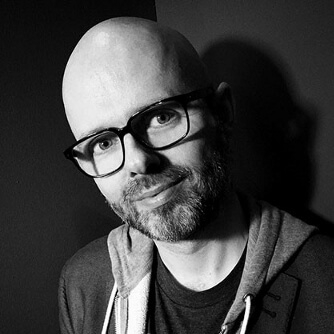Applied thinking expert at the Thought Expansion Network
View Author Profile
Opinions
Time To Stock Up Your Mental Larder
Some essential tips to help improve your idea generation and problem-solving abilities.

There’s an experience I often have just before I decide to take a trip to the supermarket. I open the fridge, take a look at the shelves, rummage around in the salad drawers and inspect the line of jars in the back of the door.
At that point I sadly realise I don’t have the right ingredients to make a decent meal. So, I revert to something easy and familiar. This usually involves boiling some pasta and finishing off that jar of pesto that’s been hanging around in my fridge for a few weeks. You might experience something similar from time to time.
In this situation, the only thing that will make things better is a trip to Tesco.
It’s pretty obvious stuff, isn’t it?
Yet, as someone who helps people and businesses come up with better ideas, I’m most commonly asked to teach idea-generation techniques (usually referred to as ‘brainstorming exercises’). And - yes - I can do that. But it doesn’t address the real problem.
It’s like teaching people how to sharpen a knife or chop an onion or fillet a halibut. They’re good skills to have but they won’t take you very far when you have a badly-stocked larder filled with generic ingredients.
The brain is a processor. It follows the classic flow of input, process, output. If you’ve got limited input, you’ll have limited output. If you have the same input as everyone else, you’re likely to come up with the same kind of ideas as everyone else.
But if you have unusual and diverse input that no one else has, you can come up with ideas that no one else can. That makes you valuable.
So rather than focusing on connecting the dots, I recommend you get into the habit of collecting the dots. Here are some exercises you can do on your daily commute to start filling your brain with more exotic ingredients.
Oooh! I never noticed that before!
Let’s start nice and easy. This is about becoming more observant. You can do this in any environment you’re familiar with - the inside of a bus, the train platform you’re standing on, the pavement you’re walking along or whatever.
Set yourself the daily challenge of spotting three things you’ve never noticed before. This will start out pretty easy for the first few days. But very quickly you’ll have to move beyond the obvious stuff and start looking harder. Ask yourself questions about each observation.
What is it? How would you describe it? Why is it there? Is it important? This helps you wrap your mind around the observation and understand its importance.
Broadening your input like this can have another beneficial side-effect: it can make you lucky. You’ll never spot the twenty pound note in the gutter if you’re just looking directly ahead. And this extra luck can extend to the workplace.
If you develop the habit of looking beyond the obvious, you’ll start seeing opportunities that no one else spots. Your colleagues will think you’re a genius.
What on earth are they thinking?
People are fascinating. Start observing their behaviour and reactions (without looking like a creep, preferably). Why does that person stand at the same spot on the train platform every day? Why is that driver so close to the car in front? Why is that person expressionlessly staring out of the window?
Try to work out why they are behaving the way they are. What past experiences could have led them to this behaviour? Are their actions beneficial to them? What impact are their actions having on others? This kind of observation builds empathy and helps you to understand people’s motivations.
Most problems you face involve people in some way. Developing a better understanding of why people act the way they do and what would motivate them to behave differently will help you solve problems more effectively. And help you to communicate your ideas to decision-makers more persuasively.
Let’s do this better
The world is full of systems, conventions and rituals that we take for granted. You’re probably pretty comfortable buying a train ticket where you live but there’s a good chance you’d be utterly bamboozled doing the same thing in Tokyo or Prague or Kinshasa.
Start identifying the way people do things. Break processes down into their constituent steps. And ask yourself if there’s a better way of doing it.
Could cars organise themselves more efficiently at a junction? Are train ticket barriers the best option? How do people deal with oncoming pedestrians on the pavement? Try to improve the process in different ways. How could it be done faster or cheaper or in a way that makes more people happy?
This exercise helps you get into the habit of questioning assumptions and looking for things to be improved. It also helps you understand a variety of processes and systems that you can potentially apply to different problems. The more of these understandings you have in your head, the better equipped you are to come up with effective ideas.
Habit beats talent
The most common misunderstanding about creativity is that some people have a special talent and others don’t. This just isn’t the case. Some people may have a brain that’s wired slightly better for generating ideas than others, in the same way as some people have bodies that are more suited to being a marathon runner than others.
What makes the difference is the work you put in. Having the ideal marathon runner’s body won’t help you if you’re a couch potato.
It’s the same with thinking. If you don’t put in the effort to develop it, you can’t expect to perform at a high level.
These exercises will help anyone improve their problem-solving abilities and - more important - stock their mental larder with the ingredients to cook up some really tasty ideas.
Dave Birss, creativity and applied thinking expert and speaker in the Thought Expansion Network – a community of world-class thinkers, business brains and social activists: www.ten.io/talent
Most read in Opinions
Trending articles on Opinions
Top articles on Minutehack
Thanks for signing up to Minutehack alerts.
Brilliant editorials heading your way soon.
Okay, Thanks!


